Are You A Vanguard? Applications Now Open
Danielle Prokop/El Paso Matters
This is your first of three free stories this month. Become a free or sustaining member to read unlimited articles, webinars and ebooks.
Become A MemberThis story was co-published with El Paso Matters as part of our joint Equitable Cities Reporting Fellowship For Borderland Narratives.
First, she stumbled across Sunrise El Paso’s Instagram account. Then, stuck at home during the pandemic, she began using her free time to organize for local environmental justice initiatives with them.
Before she knew it, 25-year-old El Paso resident Ana Fuentes was leading the grassroots campaign for Sunrise El Paso — part of the national youth movement demanding urgent action on climate change — to radically overhaul the city’s policymaking to put climate impact first.
“This was a time when we were feeling very isolated, but for me, it was a time when I found my community,” says Fuentes. “I’ve always been passionate about justice and advocating against systems of oppression but had never found a community of people who were just as passionate about it and wanted to do something about it.”
Their vision: Giving El Pasoans a rare chance to write a pioneering plan for climate action into their city’s charter, which would have transitioned the city toward 100% renewable energy and explored municipalization of the local electric utility.
After collecting nearly 40,000 signatures, the group scored a victory in putting Proposition K on the ballot during the city’s May election. The Nation called it “one of the most important pieces of climate policy you’ve likely never heard of”; The Guardian called it “a first-of-its-kind municipal climate charter” that “could throw a wrench in US fossil fuel extraction.”
The ballot initiative was immediately contentious, with local business groups and the fossil fuel industry launching a fierce million-dollar fight to defeat it. Even in blue El Paso, the measure was ultimately rejected by nearly 82% of voters.
Now, in the wake of their loss, Sunrise El Paso is undergoing an internal transformation. The group relaunched in September as Amanecer People’s Project (“amanecer” being Spanish for “sunrise”) with Fuentes as its executive director.
By activating El Pasoans of all ages rather than exclusively focusing on youth organizing, Amanecer will focus on “building the community power we need to get the future we want,” Fuentes says.
“We need smaller, tangible wins to bring people into the climate fight. To recognize that this is something we can change, we don’t have to accept that it’s a lost cause. We need wins to give our community hope.”
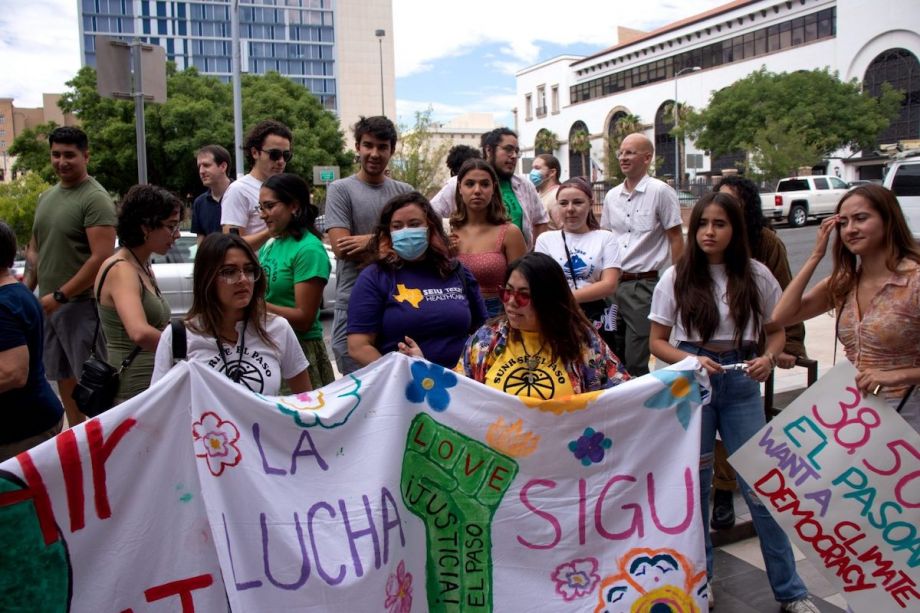
Volunteers and organizers with Sunrise El Paso and Ground Game Texas gather outside of El Paso City Hall on July 25, 2002, to urge that City Council place the Climate Charter on the ballot. (Photo by Danielle Prokop / El Paso Matters)
Environmental justice activist Miguel Escoto, an organizer at the nonprofit Earthworks, founded Sunrise El Paso in 2019. In its first campaign, the group unsuccessfully fought to prevent the $4.3 billion acquisition of El Paso Electric by a multibillion-dollar investment fund advised by J.P. Morgan Chase.
Its next major campaign – the first that Fuentes joined – supported residents’ efforts against a new El Paso Electric (EPE)-owned natural gas power plant unit in Northeast El Paso. El Paso Electric first pushed to expand the Newman Power Station just south of Chaparral in 2019, before a lawsuit led by residents in Chaparral and El Paso environmental organizers temporarily blocked the project over air pollution and public health concerns.
Activists and Chaparral residents eventually settled with EPE. That allowed the power plant project to proceed, but it prevented EPE from developing additional fossil fuel construction at the site and required the utility company to cut emissions at the Newman plant by 40%. It also established what might have been the first agreement by a U.S. utility to establish a fossil fuel moratorium, including natural gas.
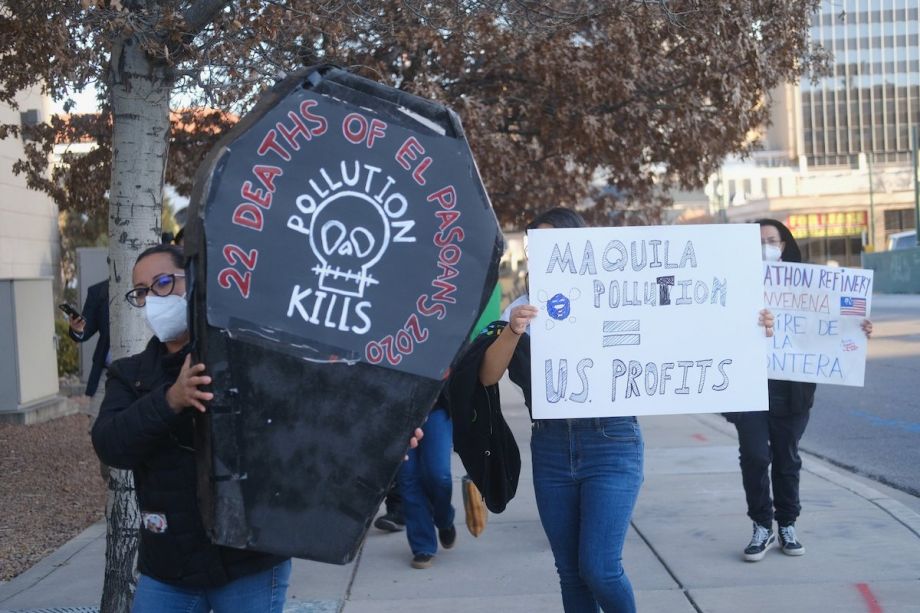
Familias Unidas del Chamizal and Sunrise El Paso members march around the E. Franklin Texas State Building on Feb. 11, 2022 protesting the Texas Commission on Environmental Quality's recent actions blaming Ciudad Juárez for the region's poor air quality. (Photo by Danielle Prokop / El Paso Matters)
As part of the settlement, EPE paid the legal fees in the case and donated $400,000 to the community group. Chaparral residents donated the money to enable Sunrise El Paso’s next project: passing a climate charter.
Environmental organizers in El Paso believe that much more of the electricity that powers the “Sun City” should come from non-polluting solar farms; while El Paso ranks as a top city for solar power capacity, the city only sources 5% of its energy from renewables.
More broadly, the climate charter’s backers sought to challenge the power dynamics in the city, where organizers often say an insular circle of wealthy power brokers control decision-making at the expense of the city’s poor, largely Latinx neighborhoods. As proof, they pointed a major oil refinery — where a flame that regularly burns from a large tower lights up the area, and the smell of rotten eggs at times fills the abutting neighborhood — which sits in the middle of a primarily Hispanic community on the near Eastside.
After four months of brainstorming, Fuentes says, the group decided to create a municipal climate charter with specific, concrete goals in mind.
“It came from being rooted in the knowledge of the influence that the fossil fuels industry has in El Paso,” she says. “One of the things we added was that the climate director did not have any ties to the fossil fuel industry. We also knew that the Permian Basin is set to increase its production in the next couple of decades. We wanted to protect our water because eventually, they would want to tap into our resources.”
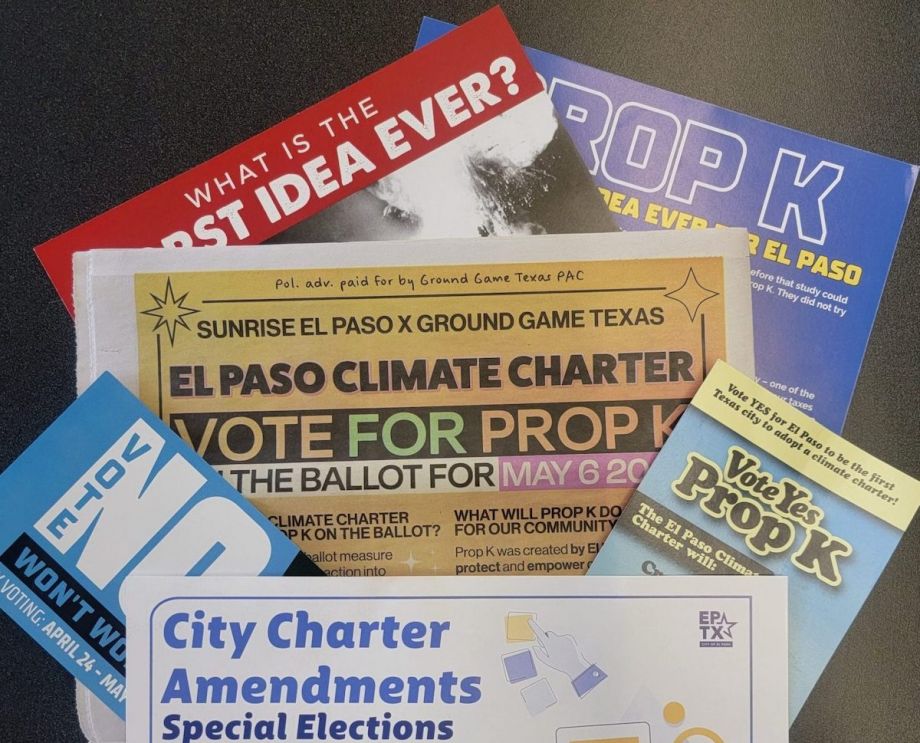
Mailers sent out by supporters of Proposition K. (Photo by El Paso Matters)
Under home rule, El Paso residents have the right to petition for charter amendments to go on the ballot. Working with the Austin-based Ground Game Texas, the coalition gathered nearly 40,000 signatures from registered voters — double the 20,000 required — to add the measure to the ballot. The excess signatures were presented to ensure the requirement was met and the measure could be introduced during the November 2022 election.
“We turned them in last summer with the intention of making it to the November ballot, but the city clerk argued that the work of verifying the signatures would take 100 days,” says Fuentes. “We got pushed to the May election.”
Once the signatures were verified, the group turned to a ‘get out to vote’ phase, canvassing residents to explain the proposition’s language and encouraging voters to cast their ballots while “fighting a lot of misinformation that was going on,” Fuentes says.
While the Ground Game Texas-led PAC supporting the climate chart spent around $11,000, two political action committees poured over $1.1 million into campaigns against Proposition K.
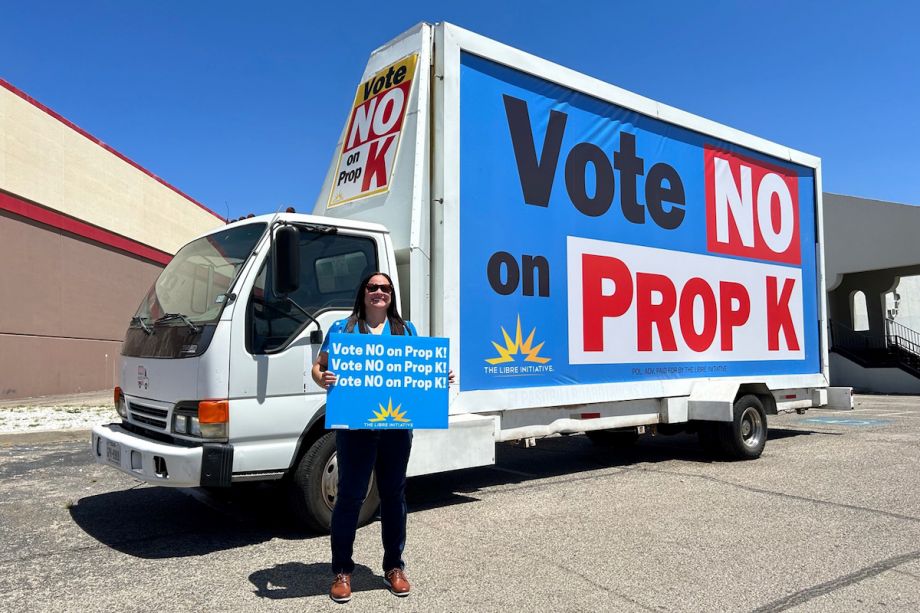
Proposition K drew an aggressive election campaign opponents of the measure on the May 6 ballot. (Photo by El Paso Matters)
Consumer Energy Alliance, a Houston-based group of major energy and industrial firms, shelled out $633,000 on television ads and mailed fliers urging voters to reject Prop K. Meanwhile, a PAC established by the El Paso Chamber spent $486,000 opposing the measure. A study funded by the Chamber declared that adopting Prop K would wipe out half of the jobs in El Paso, a claim that energy researchers in Austin say was “flawed” and “irrational.”
Fuentes sees victories in Sunrise El Paso’s work. “We’ve inspired a lot of people, as demonstrated by how many people have come to our orientations this summer,” Fuentes says. “El Paso had never talked about climate change and justice at that scale before. We motivated people to take action.”
She also knows the group made mistakes.
Critics called the proposed charter amendment vague, overly broad, and complicated. The proposition was a 2,500-word collection of several wide-ranging climate policies that backers sought to install into El Paso’s City Charter. It would have required the city to establish a climate department, track air pollution in the region, and examine bringing El Paso Electric under the city’s ownership, among other major overhauls.
Adopting Prop K would also have blocked El Paso Water from selling water to two of EPE’s local power plants that supply a chunk of the city’s electricity. And it would have blocked workers in the energy industry from participating in a citywide climate commission – something even some supporters of Prop K disagreed with.
After the loss of Prop K, Fuentes says the group learned some hard lessons about how to face powerful, well-resourced opposition with millions of dollars at their disposal.
“The advantage that we have over them is that we are rooted in our community,” she says. “The disadvantage that we had during the campaign was that we didn’t have an established strong enough connection where we were relatable to a broader community base.”
That established community support would help combat a common critique they faced during the campaign, where opponents indicted them as outsiders working with a national group.
“I think that’s something that the opposition really capitalized on,” Fuentes says. “Moving forward, we want to make a clear distinction that we are rooted in El Paso and that we want a permanent presence as our own independent organization.”
The results of the vote, Fuentes says, should not paint El Paso as a city that doesn’t care about climate change. She points out that the opposition spent on ads to dissuade voters from supporting Prop K, including campaign materials suggesting El Pasoans would be forced to pay to convert their appliances from gas to electric if it passed.
“The electorate that came out against Prop K was disproportionately older and whiter than our community,” she says. “I don’t want our community to look at those numbers and say that people don’t want action against climate change. Very specific people were scared and mobilized to vote as they did.”
Fuente says the Amanecer People’s Project has no immediate plan to focus on putting another measure in front of voters. As it is, voting laws prevent a charter amendment from being introduced within two years.
“Our goal moving forward is to have our membership guide our work,” she says. “We’ll start having listening canvases, having conversations with our community about problems that they have as it pertains to the climate crisis and some solutions. I’m not saying that it wouldn’t be the climate charter, but it’s open to what the membership wants.”
Any new campaigns, however, would be more tangible, says Fuentes. She believes it was challenging for everyday people to identify with the original climate charter and its impact.
“It was difficult to have conversations with our community members about pinpointing how their life would change after the proposition would pass,” she says. “Moving forward, we want to be punchier in the sense that our community can find our fight much more relatable and identify the ways in which their life would improve.”
One takeaway was the overwhelming and rapid response of opponents, whom Fuentes says used their power and influence to create fear to “motivate people to vote against something that they do believe in.”
In their next iteration, she says, “We want to be more connected and have more El Pasoans being part of the fight because then that fear tactic won’t be as powerful.”
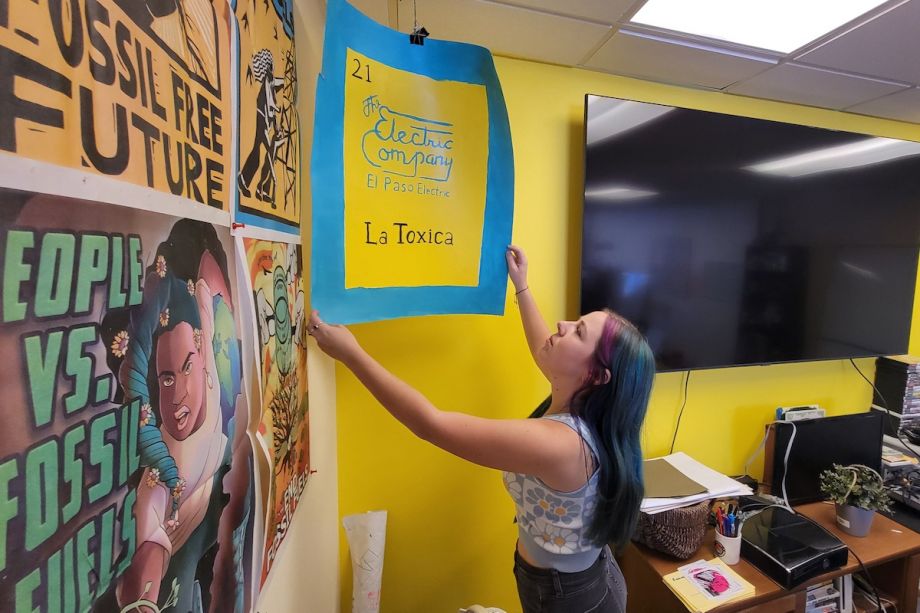
Ana Fuentes, Executive Director of Amanecer’s People Project adjust a makeshift loteria card calling the El Paso Electric Company la Toxica. (Photo by Christian Betancourt)
Amanecer People’s Project will be an umbrella group that includes Sunrise El Paso as its youth organizing branch. Funding will come from membership fees, grants, and donations.
“We’re opening up to a broader audience because we know that we need as many people to be part of the organization and part of our fight,” Fuentes says. “We want to be the decision-makers and see El Paso transform into the El Paso that we want to see as it pertains to like clean air and clean water and community control.”
The new group will officially launch with an event on Sept. 30. Amanecer is also planning a “Toxic Tour of El Paso” the same day, which will visit the Marathon oil refinery and El Paso Electric natural gas power plants to examine sources of pollution. (El Paso Electric and Marathon did not respond to requests for comment about the tour highlighting their facilities.)
Amanecer is being boosted in its kickoff by U.S. Rep. Ro Khanna, who represents part of Silicon Valley in Congress and is viewed as a future presidential contender by progressive Democrats.
In an interview with El Paso Matters, Khanna says national leaders of the Sunrise Movement encouraged him to help with environmental and climate change efforts in El Paso. He believes that smart climate policy and industrial growth can go hand in hand.
“One of the things we need to explore in towns like El Paso is the diversification of the economy – that we understand that obviously the oil and gas sector supports a lot of jobs in Texas and supports working class and middle-class jobs,” Khanna says in an interview in Austin, where he was participating in the Texas Tribune Festival. “And we’ve got to create new economic opportunities in new manufacturing in other industries, so that as we transition away from fossil fuels to renewable energy, that we see an expansion of economic opportunity in places like El Paso.”
Amanecer People’s Project, Fuentes says, will be a power-building group to give decision-making power in the city back to the people. Crucial to that strategy will be a thorough power analysis of the community to figure out opposition and allies.
“We’ve been very reactive in the way we’ve operated in the past,” she says. “We want to be more proactive during these coming years. Start working around what we want to see (happen).”
Robert Moore of El Paso Matters contributed reporting to this story.

Christian De Jesus Betancourt is Next City and El Paso Matters' joint Equitable Cities Reporting Fellow for Borderland Narratives. He has been a local news reporter since 2012, having worked at the Temple Daily Telegram, Duncan Banner, Lovington Leader and Hobbs News-Sun. He's also worked as a freelance reporter, photographer, restaurant owner and chef. Born and raised in Juarez, El Paso became Betancourt’s home when he moved there in the seventh grade.
Diego Mendoza-Moyers is a reporter covering energy and the environment. An El Paso native, he has previously covered business for the San Antonio Express-News and Albany Times Union, and reported for the metro newspapers in Las Vegas and Phoenix. He graduated from Arizona State University with a B.A. in journalism.

20th Anniversary Solutions of the Year magazine